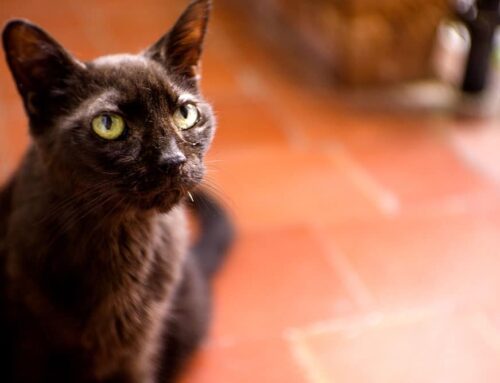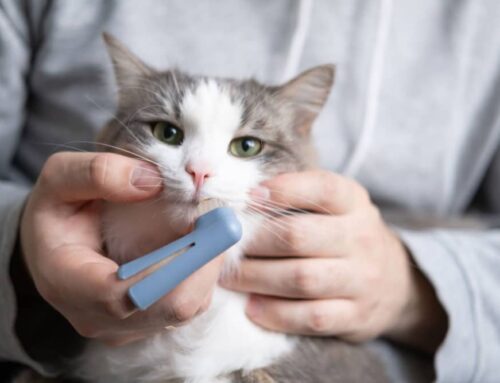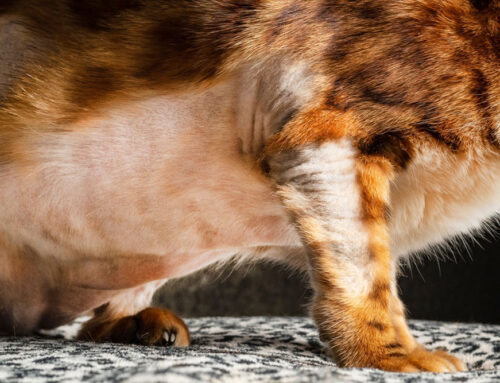As cat owners, we strive to provide our cherished companions with the best nutrition possible. However, with the myriad of pet food information available, much of it myth, how do you know what constitutes a healthy diet for your feline friend? Our Just Cats Clinic team debunks some of the most common cat diet myths, so you can confidently choose the best diet for your whiskered friend.
Myth 1: Dry food is better for cats’ dental health
Fact: While many believe that kibble helps clean a cat’s teeth, studies show that its benefits in reducing plaque and tartar buildup are minimal. In fact, some dry foods are high in carbohydrates, leading to obesity and diabetes. A diet that includes some wet food can provide better hydration. Toothbrushing at home with pet-safe dental care products, combined with regular professional dental cleanings, better promote good oral health. In other words, food type cannot replace daily toothbrushing or veterinary dental exams and cleanings.
Myth 2: Grain-free diets are better for cats
Fact: Pet owners who are proponents of grain-free diets also believe these diets are better for their pets to avoid allergies, this is not the case. Cats rarely develop specific grain allergies. In grain-free cat foods, the grains are usually replaced by other carbohydrates, including potatoes or peas, which can be equally problematic. To provide your cat’s nutritional needs, focus on a balanced diet with high-quality protein sources rather than eliminating grains.
Myth 3: Cats can self-regulate their food
Fact: Like dogs, cats often do not self-regulate their food intake and will overeat if they have free access all day. Overeating can lead to obesity and related health issues, such as diabetes and joint problems. Some cats may eat only a moderate amount when allowed to “graze,” but when you keep their food bowl full, you cannot monitor the amount they eat. By monitoring your cat’s food intake, you can realize early that they are over- or undereating and detect the underlying health condition that is the cause. Maintain your furry pal’s healthy weight by measuring exact portions based on feeding guidelines from your vet and establishing regular feeding schedules.
Myth 4: Homemade or raw diets are healthier
Fact: While homemade diets can offer ingredient control, they require careful planning to ensure your cat’s nutritional needs are met. Many homemade meals lack essential nutrients or have imbalances that can lead to deficiencies or excesses. Homemade diets can also be challenging because they can easily become contaminated without scrupulous hygiene. And, if you turn to online recipes, they often are inaccurate and not necessarily nutritious. Always consult with a boarded Veterinary Nutritionist before choosing to prepare homemade meals for your favorite feline.
Myth 5: Cats can thrive on a vegan or vegetarian diet
Fact: Cats are obligate carnivores, meaning their bodies are designed to thrive on nutrients found primarily in animal tissues. Animal products naturally include essential nutrients, such as taurine, arachidonic acid, vitamin A, and vitamin B12. A vegetarian or vegan diet lacks these critical nutrients and can lead to severe health issues, including heart disease and blindness, in your cat.
Myth 6: Cats love and should drink milk
Fact: Contrary to popular belief, most adult cats are lactose intolerant and cannot digest milk, which can lead to digestive upset, including diarrhea and stomach cramps. Instead, ensure your kitty can access fresh water at all times. Consider adding some tuna or tuna water to your cat’s regular food for a special treat.
Myth 7: Table scraps are safe for cats

Fact: Many foods we eat and enjoy, including onions, garlic, chocolate, and the artificial sweetener xylitol, can be highly toxic to pets. Additionally, table scraps can contribute to an unbalanced diet, leading to obesity and other health problems. Stick to high-quality cat food designed to meet your cat’s nutritional needs and reward them with their favorite nutritional treats, and cuddles, rather than table scraps.
When you know the truth about cat nutrition, you can ignore the myths and make informed decisions about your pet’s food. Contact our Just Cats Clinic team before making significant changes to your cat’s diet. We can help you formulate a balanced, specific diet that meets your cat’s individual needs and will contribute to a long, happy life.













